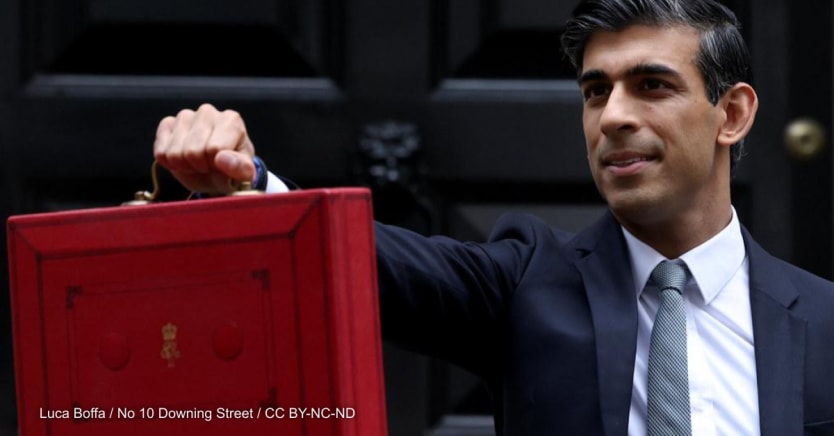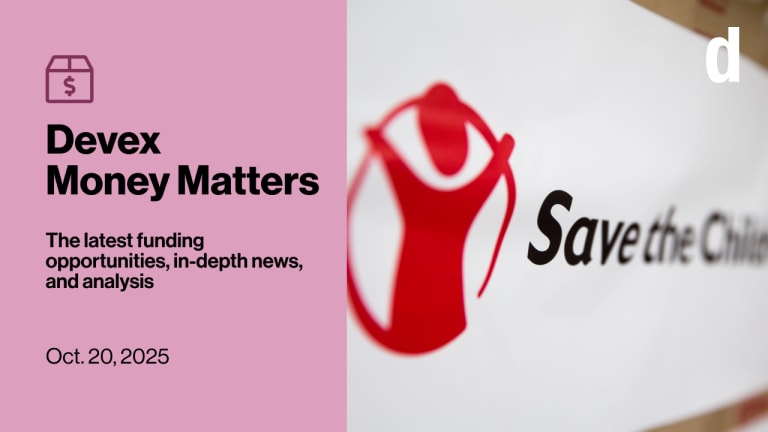
The United Kingdom’s aid budget is “scheduled” to return to 0.7% of gross national income in 2024-25, according to Chancellor Rishi Sunak, but experts fear that the budget, which has already been reduced to 0.5%, will be cut still further before then — if the increase happens at all.
Development campaigners insist extra aid spending is needed immediately amid numerous global crises and ahead of the 26th United Nations Climate Change Conference of the Parties, and they have called for the 0.7% target to be restored sooner.
“While the chancellor was keen to present today’s budget announcement as one of largesse, the reality is that he has once again reduced British support for the world’s poorest and most vulnerable children.”
— Alastair Russell, senior public affairs adviser, Save the Children UKBut the autumn budget and spending review announcement Wednesday appeared to confirm to experts their concerns that the Treasury will count items such as COVID-19 vaccines, debt relief, and Special Drawing Rights — a reserve currency issued by the International Monetary Fund — against the aid budget.
Further development programs are likely to be cut because the 0.5% target is being treated as a fiscal ceiling, according to development finance experts.
Devex asked the government whether the SDRs, vaccines, and debt relief would be additional to or included in the 0.5% aid budget but was not given a clear answer.
“It seems the hosts of the crucial COP 26 climate talks are setting themselves up to fail by throwing away any moral authority they might have had to hold others to account,” said Andrew Norton, director at the International Institute for Environment and Development, citing the cut to the 0.7% budget and a lack of reassurance over the SDRs. He expressed worry that the failure would jeopardize “the climate finance pledges necessary to address the climate crisis we all face.”
“To find out that the government will not return to the 0.7% until at least 2024 is frankly appalling and a sure sign that the 0.5% target is not just a move caused by a temporary lack of resources,” said Alvaro Bermejo, director general at the International Planned Parenthood Federation.
“As well as helping people at home, our improving fiscal situation means we will meet our obligations to the world’s poorest,” Sunak told Parliament on Wednesday.
“I told the House [of Commons] that [when] we met our fiscal tests, we would return to spending 0.7% of our national income on overseas aid. Some people said this was a trick or a device, I told this House it was no such thing, and based on the tests I set out, today’s forecasts show that we are in fact scheduled to return to 0.7 in [2024-25] ... before the end of this Parliament.”
But if Sunak’s fiscal tests — when the government is not borrowing for day-to-day spending and debt is falling — are not met, returning to 0.7% aid spending is not guaranteed. “Should future forecasts deteriorate, decisions on the provisional ODA [official development assistance] funding for 2024-25 will be made through annual reviews of the ODA budget,” said the Treasury document.
There is “large uncertainty in it happening,” according to Richard Watts, a senior adviser on development finance at Save the Children UK.
Despite Sunak’s suggestions that aid spending will eventually increase, there were grave concerns within the development sector that further spending cuts would soon be on the way because of the Treasury's stance on SDRs, COVID-19 vaccines, and debt relief.
Alastair Russell, senior public affairs adviser at Save the Children UK, said: "While the chancellor was keen to present today’s budget announcement as one of largesse, the reality is that he has once again reduced British support for the world’s poorest and most vulnerable children by confirming a third round of major cuts to U.K. aid.”
Ranil Dissanayake, a policy fellow at the Center for Global Development, agreed that the document “seems to confirm that both vaccine donations and SDR reallocations will count towards the 0.5% of GNI target, and we can probably assume that the cancellation of debt owed by Sudan will count as well — ignoring calls to make these additional to the minimum spending commitment.”
“It now looks certain that the Treasury will use accountancy trickery. … There will be even less funding for humanitarian and development programmes and potentially a third round of cuts to life-saving work,” said Stephanie Draper, chief executive at Bond, the network for British NGOs.
The budget set out the planned aid spending to be shared across government departments for the next three years: £11.4 billion ($15.7 billion) in 2022-23; £11.8 billion in 2023-24, and £12.3 billion in 2024-25. In 2024-25, the Treasury is also setting "aside additional unallocated ODA funding ... to the value of the difference between 0.5% and 0.7% of GNI.” The allocations exclude predicted aid spend for some items including gift aid and IMF contributions, according to Watts.
Update, Oct. 28, 2021: This story was updated to reflect the U.K. government’s response.








